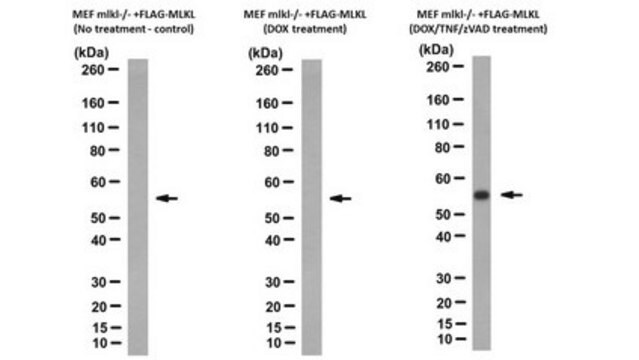ABC2036
Anti-MLKL
from rabbit
Sinónimos:
Mixed lineage kinase domain-like protein, hMLKL
About This Item
Productos recomendados
origen biológico
rabbit
Nivel de calidad
forma del anticuerpo
affinity isolated antibody
tipo de anticuerpo
primary antibodies
clon
polyclonal
reactividad de especies
human
técnicas
immunohistochemistry: suitable (paraffin)
western blot: suitable
isotipo
IgG
Nº de acceso NCBI
Nº de acceso UniProt
Condiciones de envío
ambient
modificación del objetivo postraduccional
unmodified
Información sobre el gen
human ... MLKL(197259)
Descripción general
Especificidad
Inmunógeno
Aplicación
Apoptosis & Cancer
Immunohistochemistry Analysis: A 1:250 dilution from a representative lot detected MLKL in human tonsil and human squamous cell carcinoma tissue sections.
Calidad
Western Blotting Analysis: A 1:500 dilution of this antibody detected MLKL in 10 µg of HT-29 cell lysate.
Descripción de destino
Forma física
Almacenamiento y estabilidad
Otras notas
Cláusula de descargo de responsabilidad
¿No encuentra el producto adecuado?
Pruebe nuestro Herramienta de selección de productos.
Código de clase de almacenamiento
12 - Non Combustible Liquids
Clase de riesgo para el agua (WGK)
WGK 1
Certificados de análisis (COA)
Busque Certificados de análisis (COA) introduciendo el número de lote del producto. Los números de lote se encuentran en la etiqueta del producto después de las palabras «Lot» o «Batch»
¿Ya tiene este producto?
Encuentre la documentación para los productos que ha comprado recientemente en la Biblioteca de documentos.
Nuestro equipo de científicos tiene experiencia en todas las áreas de investigación: Ciencias de la vida, Ciencia de los materiales, Síntesis química, Cromatografía, Analítica y muchas otras.
Póngase en contacto con el Servicio técnico